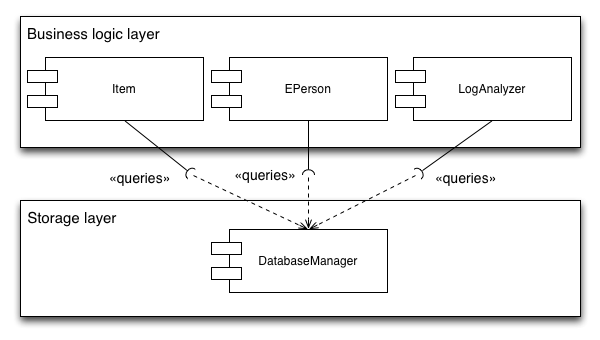Introduction
The DSpace API was originally created in 2002, very little has changed in the way we work with our API. After working with the API day in day out for over 7 years I felt it was time for a change. In this proposal I will highlight the issues that the current API has and suggest solutions for these issues.
How things are now
Bad distribution of responsibilities
Currently every database object (more or less) corresponds to a single java class. This single java class contains the following logical code blocks:
- CRUD methods (Create & Retrieve methods are static)
- All business logic methods
- Database logic (queries, updating, …)
- All getters & setters of the object
- ….
Working with these types of GOD classes, we get the following disadvantages:
- By grouping all of these different functionality's into a single class it is sometimes hard (impossible ?) to see which methods are setters/getters/business logic since everything is thrown onto a big pile.
- Makes it very hard to make/track local changes since you need to overwrite the entire class to make a small change.
- Refactoring/altering GOD classes becomes hard since it is unclear where the database logic begins & where the business logic is located.
Database layer access
- EPerson table is queried from the Groomer and EPerson class.
- Item is queried from the LogAnalyser, Item, EPerson classes
This makes it hard to make changes to a database table since it is unclear from which classes the queries are coming from. Below is a schematic overview of the usage of the item class:
Postgres/oracle support
String params = "%"+query.toLowerCase()+"%";
StringBuffer queryBuf = new StringBuffer();
queryBuf.append("select e.* from eperson e " +
" LEFT JOIN metadatavalue fn on (resource_id=e.eperson_id AND fn.resource_type_id=? and fn.metadata_field_id=?) " +
" LEFT JOIN metadatavalue ln on (ln.resource_id=e.eperson_id AND ln.resource_type_id=? and ln.metadata_field_id=?) " +
" WHERE e.eperson_id = ? OR " +
"LOWER(fn.text_value) LIKE LOWER(?) OR LOWER(ln.text_value) LIKE LOWER(?) OR LOWER(email) LIKE LOWER(?) ORDER BY ");
if(DatabaseManager.isOracle()) {
queryBuf.append(" dbms_lob.substr(ln.text_value), dbms_lob.substr(fn.text_value) ASC");
}else{
queryBuf.append(" ln.text_value, fn.text_value ASC");
}
// Add offset and limit restrictions - Oracle requires special code
if (DatabaseManager.isOracle())
{
// First prepare the query to generate row numbers
if (limit > 0 || offset > 0)
{
queryBuf.insert(0, "SELECT /*+ FIRST_ROWS(n) */ rec.*, ROWNUM rnum FROM (");
queryBuf.append(") ");
}
// Restrict the number of rows returned based on the limit
if (limit > 0)
{
queryBuf.append("rec WHERE rownum<=? ");
// If we also have an offset, then convert the limit into the maximum row number
if (offset > 0)
{
limit += offset;
}
}
// Return only the records after the specified offset (row number)
if (offset > 0)
{
queryBuf.insert(0, "SELECT * FROM (");
queryBuf.append(") WHERE rnum>?");
}
}
else
{
if (limit > 0)
{
queryBuf.append(" LIMIT ? ");
}
if (offset > 0)
{
queryBuf.append(" OFFSET ? ");
}
}
